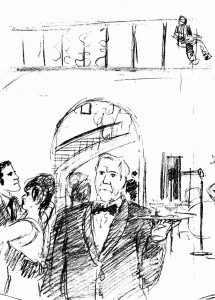Linguist George Lakoff is asking how a man who did such a marvelous job campaigning for President has stumbled so often on the issue of health care. Lakoff thus wrote an article offering some a list of language/framing advice to the Democrats. Here's the foundational concept:
The list of what needs reform makes sense under one conceptual umbrella. It is a public alternative that unifies the long list of needed reforms: coverage for the uninsured, cost control, no preconditions, no denial of care, keeping care when you change jobs or get sick, equal treatment for women, exorbitant deductibles, no lifetime caps, and on and on. It's a long list. But one idea, properly articulated, takes care of the list: An American Plan guarantees affordable care for all Americans. Simple. But not for policy wonks.
The policymakers focus on the list, not the unifying idea. So, Obama's and Axelrod's statements last Sunday were just the lists without the unifying institution. And without a powerful institution, the insurance companies will just whittle away at enforcement of any such list, and a future Republican administration will just get rid of the regulators, reassigning them or eliminating their jobs.
According to Lakoff, Obama needs to break out of his wonkish way of talking about health care. He is mistakenly operating on the principle of "policy speak":
If you just tell people the policy facts, they will reason to the right conclusion and support the policy wholeheartedly.
Lakoff argues that "policy speak" is a big mistake. Mere facts don't win arguments. Rather, the facts need to make sense to people, resonate with them and inspire them to act. Here's Lakoff's version of what should be Obama's basic message:
Insurance company plans have failed to care for our people. They profit from denying care. Americans care about one another. An American plan is both the moral and practical alternative to provide care for our people.
The insurance companies are doing their worst, spreading lies in an attempt to maintain their profits and keep Americans from getting the care they so desperately need. You, our citizens, must be the heroes. Stand up, and speak up, for an American plan.
Lakoff has lots of specifics. For instance, remind Americans that health care is a patriotic duty. Highlight the phrase "doctor-patient care." Deny that the insurance companies
care; rather, they clearly communicate that insurance companies make money by depriving us of care. Hammer the phrase "insurance company bureaucrats." Tell Americans that their health care premiums are "private taxes" levied by insurers. Remind Americans that health insurers "govern our lives." Talk about the "failure" of insurance companies. The "villainizing of real insurance company villains should have begun from the beginning.
George Lakoff is asking how a man who did such a marvelous job campaigning for President has stumbled so often on the issue of health care. Lakoff thus wrote an article
offering some a list of language/framing advice to the Democrats. Here's the foundational concept:
The list of what needs reform makes sense under one conceptual umbrella. It is a public alternative that unifies the long list of needed reforms: coverage for the uninsured, cost control, no preconditions, no denial of care, keeping care when you change jobs or get sick, equal treatment for women, exorbitant deductibles, no lifetime caps, and on and on. It's a long list. But one idea, properly articulated, takes care of the list: An American Plan guarantees affordable care for all Americans. Simple. But not for policy wonks.
The policymakers focus on the list, not the unifying idea. So, Obama's and Axelrod's statements last Sunday were just the lists without the unifying institution. And without a powerful institution, the insurance companies will just whittle away at enforcement of any such list, and a future Republican administration will just get rid of the regulators, reassigning them or eliminating their jobs.
According to Lakoff, Obama needs to break out of his wonkish way of talking about health care. He is mistakenly operating on the principle of "policy speak":
If you just tell people the policy facts, they will reason to the right conclusion and support the policy wholeheartedly.
Lakoff argues that "policy speak" is a big mistake. Mere facts don't win arguments. Rather, the facts need to make sense to people, resonate with them and inspire them to act. Here's Lakoff's version of what should be Obama's basic message:
Insurance company plans have failed to care for our people. They profit from denying care. Americans care about one another. An American plan is both the moral and practical alternative to provide care for our people.
The insurance companies are doing their worst, spreading lies in an attempt to maintain their profits and keep Americans from getting the care they so desperately need. You, our citizens, must be the heroes. Stand up, and speak up, for an American plan.
Lakoff has lots of specifics. For instance, remind Americans that health care is a patriotic duty. Highlight the phrase "doctor-patient care." Deny that the insurance companies
care; rather, they clearly communicate that insurance companies make money by depriving us of care. Hammer the phrase "insurance company bureaucrats." Tell Americans that their health care premiums are "private taxes" levied by insurers. Remind Americans that health insurers "govern our lives." Talk about the "failure" of insurance companies. The "villainizing of real insurance company villains should have begun from the beginning.
I recommend reading Lakoff's entire article, which is detailed, and thoughtful."


